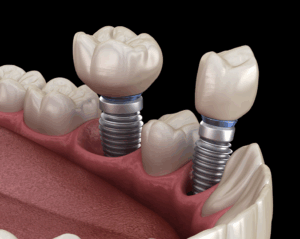Dental implants are one of the most effective and long-lasting solutions for replacing missing teeth. They restore both appearance and function, helping patients to chew, speak, and smile with confidence. However, not everyone is immediately a candidate for dental implants. Continue reading to learn more about some of the potential issues that might prevent you from getting dental implants, along with how they can be resolved.
1. Insufficient Jawbone Density
One of the main requirements for successful dental implants is a strong and healthy jawbone. The implant(s) need to fuse securely with the bone tissue through a process called osseointegration. If you’ve been missing teeth for a while, your jawbone may have deteriorated, making it difficult for the implant to take hold. In many cases, a bone graft can be performed to build up the bone and make implants a possibility.
2. Gum Disease
Healthy gums are essential for dental implants. Periodontal disease, or gum disease, can compromise the tissues that support both natural teeth and implants. Before getting implants, any signs of gum disease must be treated; otherwise, the issue can lead to a condition called peri-implantitis that causes implant failure down the road. Luckily, gum disease can be addressed in its early stages through a variety of means, depending on its severity, from scaling and root planing to antibiotic therapy and beyond.
3. Lack of Commitment to Oral Hygiene
A strong commitment to oral hygiene is essential for the long-term success of dental implants. If a patient isn’t willing or able to maintain a clean and healthy mouth, they may not be a good candidate. Your dentist will provide guidance on the daily care routines necessary to protect your implants, but beyond that, it falls on each patient to maintain a consistent regimen of brushing and flossing. Luckily, implants are easy to care for! Don’t forget that smoking and other negative lifestyle habits that impact your oral health are also relevant factors.
4. Certain Medical Conditions
It’s also worth noting that certain health conditions, like autoimmune diseases or uncontrolled diabetes, may also impact one’s implant candidacy, as conditions like these can slow healing or increase the risk of infection, among other problems. Your dentist will need to work closely with your medical provider to evaluate whether implants are a viable option for your tooth loss.
If you’re interested in dental implants, schedule a consultation with your dentist to evaluate your oral health and discuss your options; assuming you can avoid or address these issues, they should be a sure method for rebuilding your smile and improving your quality of life!
About the Practice
Our team here at Elite Oral Surgery Associates has served Worcester and the surrounding area for several years, offering a wide variety of services, including full-service dental implants placed in-house. If you have any questions about the blog or you’d like to get in touch to set up an appointment, please reach out online or call today for more information. Telephone: (774) 220-7355.

